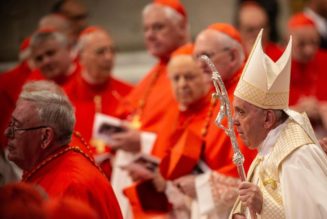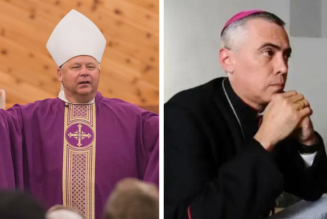SEO, that, buster!
Much news and opportunity for reflection and comment, given the past week’s stash of news related to both the synod and the new batch of cardinals and the new head of the doctrinal office who apparently is not a big doctrine fan nor of clerical accountability, etc.
So there’s that.
In order to guide my thoughts, I’ll start by pointing you to what I’ve already said. Perhaps in rereading that stuff myself, I’ll think of a new twist.
But first, a few points:
I maintain – and have since the beginning of this nonsense – that while self-described Catholic progressives have made careers out of sneering at the “Catholic ghettos” of past eras, I don’t think the tightest community of Irish Catholics crowded on Orchard Street in 1873 have a thing on the the Synod-obsessed of 2023 when it comes to solipsistic insular clubiness. Ghetto, indeed. Bubble, indeed.
Agenda-driven ideologues and bored careerists, present!
How anyone who actually lives and interacts with human beings in the real world, who actually does listen to and live amongst the seeking, the hurting, the suffering, the questioning, the lost, the indifferent – can think that the best use of Church resources and energy this moment is on this process and event is beyond me.
Unless it’s actually all…
Nah…..
The greatest irony about this irony-stuffed Synod on Synodality is fundamental and glaring. Once you see it, you can’t unsee it.
It’s this:
Anxiously desiring to show that it’s a listening Church, institutional church leaders perfectly demonstrate that they aren’t listening.
In short:
Take a look at the world around you. If your first response to the seeking, pain, suffering and questions that’s glaring evident at every level of society, in almost every home and even every heart is: let’s have a meeting on Church process and structure….you’re not listening.
…….
Instead of the go out that’s packed into every word of the Gospel, every breath of even just this Sunday’s readings, we end up with: talk and fight about territory, role, organization and process.
And so, here we go again. Not that the Church isn’t always in need of reform. Always. And those reforms can be necessary, indeed, to enable evangelization and service to a broken world to flourish.
But is this the case, right now, with this particular synod, with its particular focus? In this moment?
We’ve had a global crisis which has impacted the physical, mental, emotional and spiritual health of billions…..
Countless human beings are living in fear of illness and death, perhaps never having ever seriously confronted these realities before –
Human beings have lost income, jobs and businesses.
Great numbers of human beings struggle with questions and tensions related to the role of government and business entities in their lives.
Globally, human beings and societies are wrestling with questions of the questions of balancing autonomy, social responsibility and risk.
Human beings are flooded with information and assertions and communications, at sea regarding whose voice to trust.
Responses to this crisis have left human beings vulnerable, lonely, abandoned, anxious, fearful and broken and, let’s not forget angry.
If your answer to all of that bruised and beaten crisis-soaked world is to spend lots of time and money telling the members of Christ’s body – his hands, feet and voice on earth – that the most important thing they can do right now in this moment is to just keep talking endlessly amongst themselves about themselves….
….you’re not listening.
The point: asking Churchy people (individually and institutionally) to spend time and energy on this instead of encouraging actual evangelization and deep engagement with the Works of Mercy – is just sad.
Because you know what? All that talk, reducing authority to the person of the guy holding the microphone at the moment, all that ignore the past, trust the Spirit talk comes across to me as trust us more than anything else. Which in turn sounds like a call, not so much to clarity, but to rationalization.
I trust Jesus, Scripture and the warp and woof of Catholic tradition – which is ambiguous at times, which shifts and develops, but actually, if you can stop being so rigid and ideological about the whole thing, is actually very consistent and clear on the fundamentals – like how to live your life as a disciple of Jesus: sacrificial love, self-denial, detachment, simplicity and then even more sacrificial love.
No matter what your station in life or where your home is or what you do for a living – it’s the same for all of us.
We don’t find more Jesus in chasing the clout of the new. No, in obeying Jesus in humility and openness, informed by the richness and truth of Catholic experience, every day – every hour – we find something, well – new.
We don’t do good stuff because The Synod or the Pope Wants Us To. We don’t do it even because we feel moved by emotions we’ll label the Spirit today.
We follow Christ because we are baptized and he calls us.
And the life he calls us to is difficult, and Church teachers and institutions have failed countless times in articulating it clearly, standing up to cultural, social and political pressures, and yes, living it. But at the same time, with all that – we all know what that life is, right? We can obfuscate and rationalize, but we all, deep in our hearts, know – and we know we’re all falling short, and we know we’re more like the rich young man than we want to admit, but we also know without doubt what Jesus says – and that he means what he says…
If you follow all of this, you undoubtedly note the various voices always ready to beat down, shame and misrepresent questions and criticism of this event – you, closed, anti-Spirit, pope-hater you – some past thoughts:
But specific to this issue, considering it is, using shorthand, “progressives” who use this tactic, I will point out some irony, because irony is one of my favorite things. I would bet money that the same people who attempt to label questioning of the context and modalities of this synod process as a lack of faith have, in their day, done plenty of contextual analysis of everything from the Scriptures (Well, what Paul was really talking about here was…) to practically every single Church council, act of authority and yes….synod in the past. The conclusion always being: You have to understand this thing in its historical and cultural context. That’s where our analysis begins – and that’s what determines how we’ll accept the usefulness and applicability of this decision/teaching/practice in the present.
Which…I don’t argue with, mind you. (Much). It’s kind of what I do. All I’m saying is that, hey – if you’re going to tell me that I not only can, but must examine the Church’s past with an eye to social, historical and cultural context, and it’s permitted to critique them on that basis – well, then it’s permissible to do it in the present as well. Necessary, even. Might save us time later.
In short: if the process is questioned or critiqued ….try answering those questions in a reasonable and mature manner, treating the interlocutor as the mature, intelligent member of the laity you keep telling us we all are.
Or, to put it more bluntly: If we’re allowed to interrogate Church teaching and practice, we are allowed to interrogate the Synod process as well.
Catholic life and practice shifts, changes, ossifies and is reformed and renewed. It’s the Holy Spirit at work in all of that.
But it’s a Spirit whose actions must be carefully discerned and sifted as we engage with it and work so hard to be faithful and, most importantly, to bring the power of the Gospel, Spirit-led, into a hurting world.
Because, as we have seen time and time again, in ancient and recent history, as well as in our own lives: all that heady, optimistic Spirit-talk? As we see all around us, constantly and consistently:
Is there anything in life easier to weaponize, because we are yearning so deeply, than the promise of something new, coming to us via the warm assurances of those who identify the movement of the Spirit – good! – with whatever they want to happen next?
Resistance to “new” can, indeed, be resistance to the Spirit. It can also be fidelity to Christ. Whether that thing is “new” or not has absolutely nothing to do with the authenticity of the moment, idea or expression. “New” as I said before, is not a meaningful category for discernment in either a positive or negative sense, and neither is “old.”
In God’s time, they are meaningless terms.
Remember what Paul said up there, about not quenching the Spirit?
Let’s let him finish the thought:
“Do not quench the Spirit. Do not despise prophetic utterances…
…. Test everything; retain what is good” (1 Thess 5:19-21).
What a pity if, when the good, self-sacrificing, faithful people come to the church once a week to lay their worldly cares and troubles before the altar of God, looking for solace and peace for one brief hour, after the long days of toil and weariness, of temptation and maybe sin and discouragement, what a pity, if, when they come for bread — the bread of life — we give them a stone! — and if, when they are longing to lift up their hearts to God, as in the Preface we bid them to do, we rather drag them down to material things, to money, money and schemes for raising money.
Maybe substitute meetings, meetings and meetings about more meetings for that last phrase…eh?








